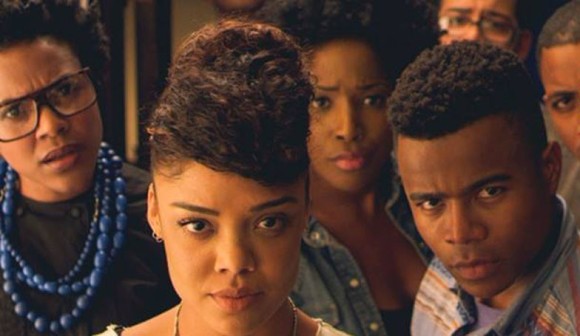
Sam and her supporters bring passion to the fight against racism, even if sometimes they lack direction.
I read a number of reviews of Dear White People when it came out in theaters. It wasn’t something that was on my radar, so it piqued my curiosity.
The handful of reviewers I read were white, all but one male. On the one hand, they seemed to like the movie to a point, particularly the cast. On the other hand, they all eventually gave it less-than-enthusiastic reviews. Yes, the third act is a bit weak and the sick father subplot isn’t relevant or necessary, but I can say that for most of the movies I see and plenty of them received better reviews than Dear White People.
Am I claiming racism? No, I don’t know any of these reviewers personally. I’m in no position to say. But it seemed largely that these reviews were the product of … discomfort, rather than something seriously lacking in the film itself. Discomfort at the portrayal of white fraternity brothers and sorority sisters who would wear black face, dress in over-the-top hip-hop apparel, even walk around carrying pieces of watermelon and buckets of chicken, all part of what is considered the party of the year on campus. There was discomfort, I’m sure, with the portrayal of President Fletcher, the white head administrator of Winchester University, when he denigrates his black counterpart, Dean Fairbanks, by blowing off any concerns he might have about racial issues on campus while the president’s son is simultaneously planning said party. Discomfort when the white student newspaper editor plays with a young black man’s hair like he’s a pet. And so on.
As someone who was in high school and college when Spike Lee’s racially charged films Do the Right Thing, Jungle Fever and Malcolm X were released, I can attest to feeling that sort of discomfort as a white kid raised in rural America traveling to a larger city to watch these films with largely black audiences. But in Lee’s films, the racism was blatant, obvious, old-school. It was a much easier racism to attack because it was so open and unapologetic. It was righteous rage against racist rage, and Lee understood how to portray battle that in unique and vivid ways. It was always apparent who was in the right and what was unacceptable. It made it much easier for someone like me to say, “Hey, I’m not like that.”
The discomfort here is because – I’m making a leap here – these reviewers probably believe much like President Fletcher, that they are living in a post-racism America. First black president. Will Smith is one of the biggest movie stars in the world, and Kobe Bryant and LeBron James are almost unparalleled global sports superstars. Busing is over, black people can vote and hardly anyone blinks at mixed-race couples anymore. How can we be racist and love Jay-Z and Beyoncé? Also, they see this sort of mentality among the people around them, for example, that it’s OK to rattle off hip-hop lines with the word “nigger” tossed around here and there among your white friends. What’s racist about that? It’s not a big deal when you pass a group of young, black males to grip your phone a little tighter, walk a little faster. Everyone knows so many of those young, black men are “thugs.” Just pays to be careful. A lot of these people just don’t get it, believing that if you’re not out on a black family’s front lawn burning a cross, you can’t be a racist. If you’re not turning dogs on peaceful black protesters, you’re not part of the problem. If you’re not flying a Confederate flag on your front lawn, it’s the equivalent of standing strongly for equality among the races.
Because of how American racism largely works now, writer-director Justin Simien has a more difficult path to walk than Spike did. Simien is trying to attack the racism inherent in the American system, a racism that is more subtle, harder to codify, deeply ingrained, more polite and often generally acceptable among white people who believe they have no racial bias. Yes, in plenty of ways we still have our obvious racism – hello, Confederate flag (it had a rough week, but that fight’s not over), Fox News and burned black churches – but when it comes to systemic things like housing, college admissions, career paths, earnings and more, it’s there, but it’s harder to grab it by the throat and scream in its face like Lee once did.
I think, largely, Simien pulled it off. Yes, Dear White People‘s third act is a bit weak, trying a little too hard to wrap it up neatly. But really, the only thing that I found unrealistic about the film was that, when there was a riot between black and white students during the hip-hop party, none of the black students ended up hospitalized or dead at the hands of the responding police.
State sanctioned white-on-black violence, in post-racial America? Maybe I give America a little too much credit for being polite and subtle about our racism. Which is why we need filmmakers such as Simien to continue to make movies that make white folks like those reviewers I read – and me – uncomfortable.